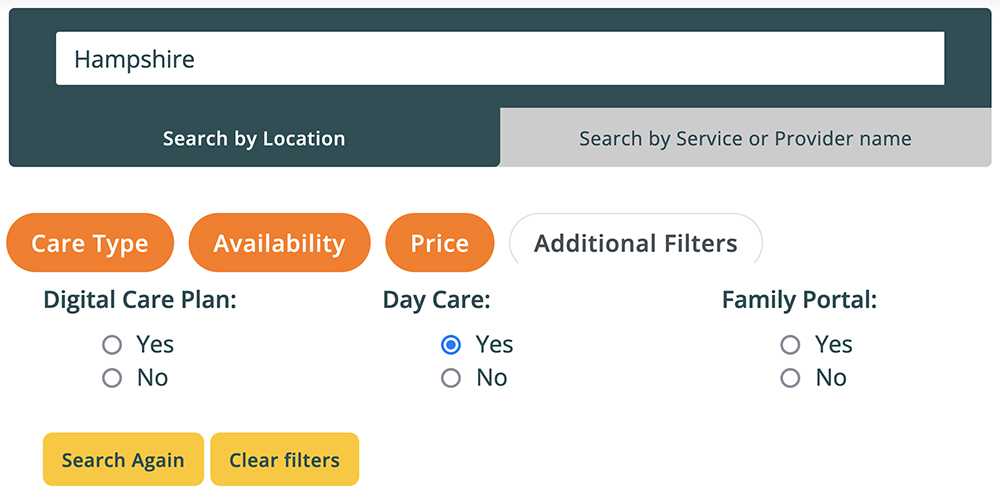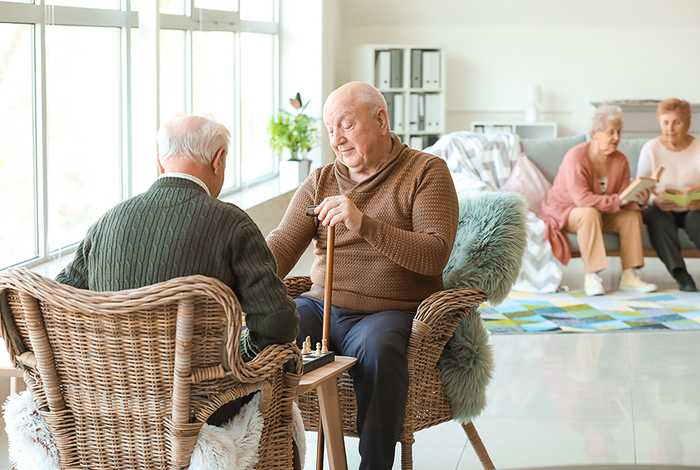Posted by Hannah Rowe
Day Care – A first step, respite, or to have fun!
As we age and become less mobile, it is sometimes easier to stay at home than go out. However, this can lead to loneliness, a common problem for older people who are experiencing life changes such as:
- Retirement
- Being widowed
- Becoming socially isolated
One way to overcome loneliness and begin to interact with other people again is to attend a Day Care service, either in a care facility or arranged by an organisation such as Age UK. But what is Day Care, and how can you find which services are available in your local area?
Possibly the easiest way is to use Autumna's care home finder and select the part of the country where you're looking for day care. We're using Hampshire as our search area in the example below.
Then select the 'Additional Filters' button, scroll down - nearly to the bottom - and tick the 'Day Care' button. Then just search again.

What is Day Care?
Day Care is a service attended by vulnerable people, where they can socialise and access other resources which may be required. These resources could be professional health services such as chiropody, or may simply be obtaining advice on a particular problem.
Day Care is often run at a facility such as a Care Home or community centre and is staffed by a mixture of professionals and volunteers (depending on the setting). Most people attending Day Care do so once a week or more.

How can Day Care help me?
There are many positive benefits to attending Day Care, which is why it is so popular amongst older people!
Socialisation
One of the benefits is the opportunity to socialise with other people and reduce loneliness. Day Care attendees will be able to meet other attendees, staff and volunteers. This means that they will interact with people of different generations, which benefits both them and the younger people through enhanced understanding.
Routine
Often when people retire, they feel that they have lost their daily routine, and it can be difficult to adapt to this change. This feeling is exacerbated if they have also been widowed, and perhaps no longer participate in activities which they did as a couple.
Attending a Day Care setting regularly brings a routine back into their life, which will bring a sense of anticipation as they look forward to seeing new friends.
Develop new skills and remain active
Day Care includes organised activities such as crafts and gentle exercise. These activities not only provide more opportunities to socialise and have fun, but they also enable participants to learn new skills and retain mobility. As we know, remaining active mentally and physically is vital in reducing cognitive decline and preventing falls in older people.
Monitor nutrition
If a person is living at home alone, it can be very difficult for their loved ones and health professionals to know if they are eating properly. Poor nutrition is a significant risk to older people, as malnutrition can result in 65% more GP visits and 82% more hospital admissions.
Day Care settings include a hot meal, so staff can ensure that the person is eating properly for the day(s) they attend and raise concerns with health professionals if they are not.
Offering respite to carers
Some older people live with family or friends or have regular support from them in their own homes. Day Care offers these carers some much-needed respite, where they know their loved one is enjoying a stimulating day in a safe environment.
Day Care as a ‘stepping stone’ to long-term care
Day Care can be an ideal first step into long-term care. For some people, the idea of moving permanently into a care home (and usually selling the family home which they may have lived in for decades) is naturally upsetting. But attending a Day Care setting at that home first, where they can get to know the staff, the home, and the surrounding area, can ease the transition and make it less stressful.
If a Day Care attendee is felt by their loved ones, carers and health professionals to need a greater level of care than they can provide at home then there are several options:
- Increase the amount of Day Care sessions per week
- Arrange for a respite stay of 1-2 weeks, where the person can be assessed more closely by the home’s care team
- Enter residential care straight away

How to find Day Care services in your area
- Autumna’s search facility enables you to find Care Homes in your area which offer Day Care.
- Age UK has lists of Day Care services in your area.
- Your local council may also provide information on Day Care facilities.
Day Care can provide a lifeline for older people experiencing loneliness and isolation. Even for people who never enter a long-term care setting, the opportunity to socialise, participate in activities and be away from home each week will enable them to overcome these feelings and play a part in the outside world again.
Day Care is not compulsory, and may not be to everyone’s taste – but if you are living alone and are vulnerable, it may be a huge benefit to you.
Talk to an Autumna care expert
If you feel unsure about whether or not Day Care is the right option for you, talk it over with one of our friendly and impartial advisors. They love to listen and can assist you with your search. Call 01892 335 330 or email info@autumna.co.uk.
Receive a Free Care Home Shortlist!
Let our expert team of advisers get your search off to a great start.
Tell us a little about your needs and we'll send you a bespoke shortlist of care homes! Click the button below to begin, it takes just a few minutes.
People also ask
How far in advance can I book respite care?
Different care providers have different policies on this but sometimes, a care home manager may ask that respite care, whether for just the day or weeks, be booked a week in advance.
This can make it difficult for unpaid carers and family members to book holidays and respite for themselves as it doesn't leave much time to plan but not all care providers have this policy in place and some do allow families to book respite care with greater notice.
Other articles to read
From the blog

Older Persons Care Advice
Annuities for care home fees: Everything you need to know
October 23rd, 2025
Learn how annuities for care home fees provide guaranteed income, financial stability, and peace of mind when planning for long-term care costs.

Older Persons Care Advice
Care options for the elderly: What is right for you?
October 17th, 2025
Discover care options for the elderly that fit your needs, from home support to residential care, helping you plan confidently for the years ahead.

Older Persons Care Advice
Are next of kin responsible for care home fees
October 17th, 2025
Find out the truth about care costs. Are next of kin responsible for paying care home fees? Learn who pays, exceptions, and how to plan ahead.






